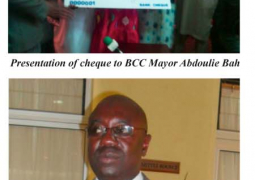Travelling from Cotonou to Lome, from Accra to Lagos, from Conakry to Abidjan and from Dakar to Banjul - to mention but a few – is as difficult and stressful as travelling through the back-way from Africa to Europe.
West African governments have long ago signed the protocol on free movement of people and goods which is expected to be implemented by all member states of the sub-region.
But as at today this is actually in theory and its implementation or translation into practice is still a far-fetched dream.
Though this problem has been a chronic disease, it was assumed that the reinvigorating steps taken by Ecowas leaders in recent years as regards free movement of people and goods would have helped to alleviate the constraints and impediments to travellers perpetuated by security apparatus such as customs and immigration officers at checkpoints across countries.
But one would get to know that the status quo in the sub-region has remained the same hearing the experiences the Gambia Chamber of Commerce and Industry (GCCI) went through getting some international exhibitors from the sub-region travel through neighbouring countries, such as Senegal, to The Gambia to attend its just concluded 9th edition of Trade Fair Gambia International held at the Independence Stadium.
Some of the exhibitors from countries like Mali, Togo and Ghana, who were trying to enter The Gambia via Senegal were said to have faced cumbersome paper procedures that held them back at the border crossing points in Senegal for days and some a whole week before making it to Banjul to attend the fair rather lately.
Some, they said, had to abandon their mission and return to their countries, for the frustrating and extortion-driven paper procedure under which they were placed.
This is regrettable more so that similar happenings at border crossing points are taking place across almost all Ecowas member-states.
Ecowas member states have vowed to make free movement of people, goods and services work well through protocols they all signed.
Ecowas’s vision is to see our people moving freely, also driven by what it calls the Community Development Programme (CDP) to contribute to the implementation of ECOWAS Vision 2020, which envisions transforming the current “ECOWAS of States” into an “ECOWAS of People”.
This new vision commits the ECOWAS Commission, more than ever in the past, to intensify its efforts and to define more ambitious programmes geared towards the enhancement of regional integration and ensuring coherence among development initiatives within the sub-region.
The Gambia and Senegal customs officials definitely have a crucial role to play in this regard.
These countries need to help facilitate legitimate trade, as well as the free movement of people, goods and services through the most direct routes.
Knowing that our countries have a unique relationship due to our historical, geographical and cultural ties, we need to continue to strengthen the cooperation by allowing free movement of people and goods.
We must remove all the numerous border controls and restrictions that are hindering the full operationalization of the Ecowas protocol on free movement of people, goods and services.
And that would help greatly in the economic integration drive promoted by member states of Ecowas.
“The keystone of successful business is cooperation. Friction retards progress.”
James Cash Penney

